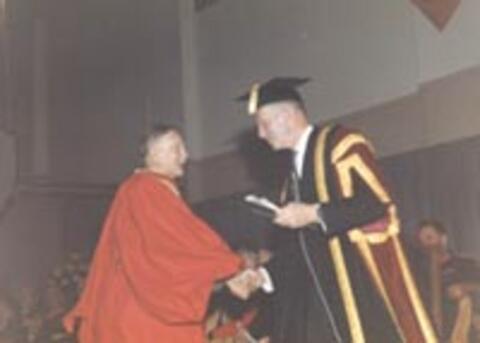
Zona do título e menção de responsabilidade
Título próprio
Honourary Degrees - Presentation - Diamond Jenness
Designação geral do material
- Material gráfico
Título paralelo
Outra informação do título
Título e menções de responsabilidade
Notas ao título
Nível de descrição
Item
Entidade detentora
Código de referência
Zona de edição
Menção de edição
Menção de responsabilidade da edição
Zona de detalhes específicos de materiais
Menção da escala (cartográfica)
Menção da projecção (cartográfica)
Menção das coordenadas (cartográfico)
Menção da escala (arquitectura)
Autoridade emissora e denominação (filatélica)
Zona de datas de criação
Data(s)
-
6 Nov. 1965 (Produção)
Zona de descrição física
Descrição física
1 photograph : col. ; 12.8 x 9.0 cm
1 negative : b&w ;
Zona dos editores das publicações
Título próprio do recurso continuado
Títulos paralelos das publicações do editor
Outra informação do título das publicações do editor
Menção de responsabilidade relativa ao editor do recurso contínuo
Numeração das publicações do editor
Nota sobre as publicações do editor
Zona da descrição do arquivo
Nome do produtor
História custodial
Âmbito e conteúdo
E.M. (Ted) Culliton, University Chancellor, making presentation of an honourary Doctor of Laws degree to Diamond Jenness at Convocation ceremony held in Physical Education gymnasium.
Bio/Historical Note; A New Zealander by birth in 1886, Diamond Jenness’s first introduction to Canada came about quite by accident in 1913 when, fresh out of Balliol College, Oxford, he served as anthropologist on the motor vessel Karluk that carried members of the Canadian Arctic Expedition into the Arctic Ocean under the leadership of Vilhjalmur Stefansson. He is one of the few to survive that ill-fated voyage and established himself as a leading anthropologist by way of his ground-breaking study of the Copper Inuit, with whom he lived for two years from 1914-1916 in the then-extremely-remote and isolated high Arctic, living the same primal existence as had their forebears thousands of years earlier. Jenness went on to undertake first-hand ethnological and anthropological studies in the Arctic and elsewhere in Canada. He authored more than 100 works on Canada’s Inuit and First Nations peoples and committed himself to fostering social and economic justice for Canada’s Aboriginals. He held senior positions in the Canadian federal public service during his long career and saw service in the trenches in the First World War and as deputy director of intelligence for the Royal Canadian Air Force in the Second World War. Jenness’s achievements and honours are many, including a Guggenheim fellowship, terms as president of the American Archaeological Society and the American Anthropological Association and five honourary degrees, including one from the University of Saskatchewan in 1965. Jenness served as chief of anthropology at the National Museum of Canada and chief of the Geographic Branch of the Canadian Department of Mines and Resources, and was named a companion of the Order of Canada. A peninsula on the west coast of Victoria Island, an island and a river in the Canadian Arctic and a high school in Hay River are named after him. In 2004 his name was used for a rock examined by the Mars Exploration Rover. Chief among his publications are Life of The Copper Eskimos, The People of the Twilight and The Indians of Canada, now in its 7th edition. One biographer, Barnett Richling, mentions that in his retirement, Jenness expressed his views on the treatment of Indigenous Peoples in Canada, advocating for the preservation of Indigenous cultures, greater integration of Indigenous people into Canadian society and a greater voice for them in national politics. Jenness died in Gatineau, Quebec, in 1969.
Zona das notas
Condição física
Fonte imediata de aquisição
Organização
Idioma do material
Script do material
Localização de originais
Disponibilidade de outros formatos
Restrições de acesso
Termos que regulam o uso, reprodução e publicação
Photographer: Gibson
Other terms: Copyright: University of Saskatchewan

